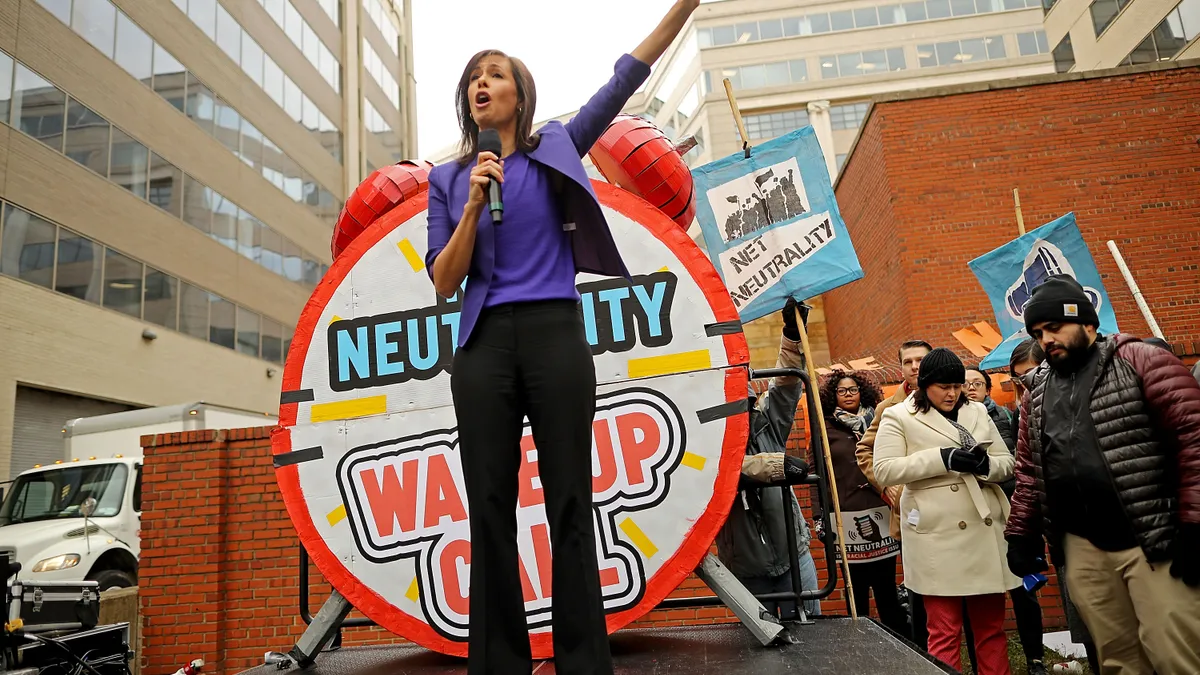Dive Brief:
- The Sixth Circuit Court of Appeals rejected the Federal Communications Commission’s effort to impose fresh net neutrality rules on internet service providers, one of the first cases in which a court has wielded the post-Chevron interpretative powers the Supreme Court granted federal judges last year.
- In Ohio Telecom Association vs. FCC, a three-judge panel of the Ohio-based court cited the 2024 Loper Bright ruling extensively in its Thursday ruling that set aside the FCC’s “heavy-handed regulatory regime.” The court sided with ISPs who objected to being classified as telecommunications services providers and not as information services.
- Net neutrality supporters say the rule protects consumers by preventing ISPs from varying access speeds or blocking access to, or favoring, certain sites. The circuit’s ruling likely ends efforts dating to the Barack Obama administration for a federal neutrality policy governing major ISPs such as AT&T, Comcast, Spectrum and Verizon Communications.
Dive Insight:
The Sixth Circuit specifically noted that it would “no longer afford deference” to the FCC’s reading of the 1996 Telecommunications Act given the Loper Bright Enterprises ruling, which ended four decades of courts deferring to regulators’ interpretation of vague wording in federal laws.
The FCC’s stance on classifying ISPs as telecommunications or information providers has alternated over the past decade, depending on the political party in power, the court noted. “Applying Loper Bright means we can end the FCC’s vacillations,” the panel wrote.
The ruling restores the status quo for internet providers that was in place during the first Donald Trump administration, which in 2018 rescinded the neutrality policy adopted under President Barack Obama. The court also applied the same standard to mobile broadband providers, preventing the FCC from imposing net-neutrality rules on them.
The Biden administration last year restored the rule with its Safeguarding and Securing the Open Internet Order, leading to litigation by a variety of ISPs.
The DC Circuit had upheld both FCC postures on ISP regulation in previous litigation, in 2015 and 2018, citing “permissible” approaches given the deference afforded by the 1984 Chevron ruling.
The Sixth Circuit’s decision represents “a major setback” for consumers and competition, the advocacy group Public Knowledge said Thursday in a statement. The organization, which supports open networks and affordable communications, filed a brief in support of the FCC’s position.
“In rejecting the FCC’s authority to classify broadband as a telecommunications service, the court has ignored decades of precedent and fundamentally misunderstood both the technical realities of how broadband works and Congress’ clear intent in the Communications Act,” the group’s legal director, John Bergmayer, said.
“The court has created a dangerous regulatory gap that leaves consumers vulnerable and gives broadband providers unchecked power over Americans' internet access.”
The ISPs’ trade group, US Telecom, said the ruling will give consumers “more investment, innovation and competition” in internet access. “Since the birth of the internet, bipartisan Administrations and policymakers have recognized the virtues of a light-touch approach to broadband regulation,” the group said in a statement.
After the ruling, FCC Commission Chair Jessica Rosenworcel called on Congress to write “open internet principles” into law. Commissioner Brendan Carr, Trump’s nominee to lead the commission, praised the ruling as “a good win for the country.”
“I am pleased that the appellate court invalidated President Biden’s Internet power grab by striking down these unlawful Title II regulations,” Carr said in a statement. “But the work to unwind the Biden Administration’s regulatory overreach will continue.”
Major ISPs will likely not use the lighter regulation afforded by the ruling to advantage their own products and services as such efforts could run afoul of antitrust and competition laws, said Aaron Tifft, a partner with Oklahoma-based Hall Estill who focuses on real estate and communications areas.
The “lighter touch” regulatory approach for internet providers under Title 1 vs. Title 2 of the 1996 Telecommunications Act “has given us an internet system that’s highly robust and I expect that to continue and develop,” Tifft said.











